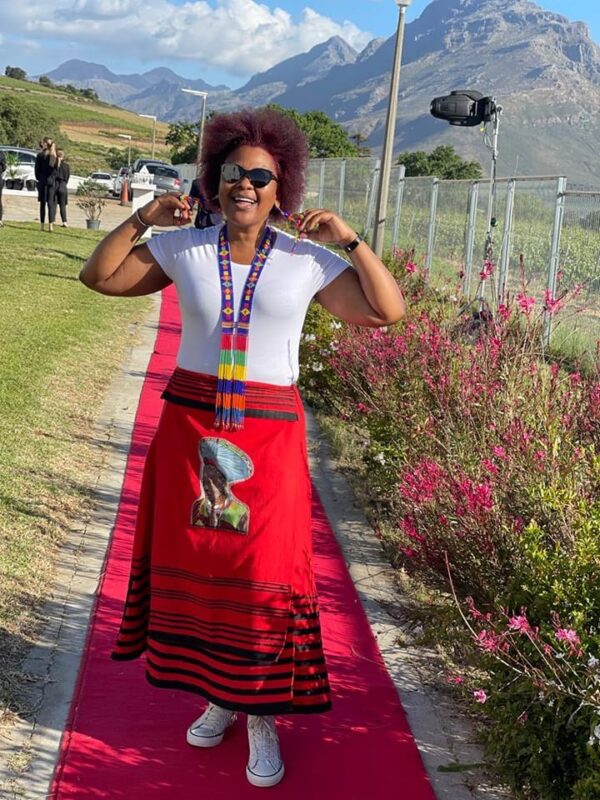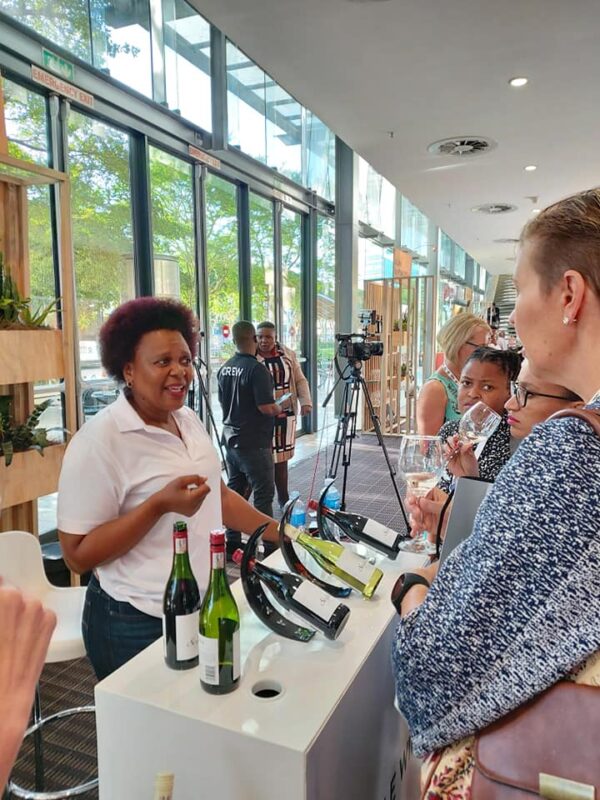
With an entrepreneurial spirit that just could not be ignored, Nondumiso Pikashe left her career as a high school teacher and jumped into the world of South African wine. This was in 2006 and since then, she has launched her own Ses’fikile Wines. Meaning “We have arrived”, the brand proudly celebrates Nondumiso’s indigenous culture. The company is 100 percent owned and operated by women, and supports girls pursuing careers in the wine industry.
Nondumiso enrolled in a garagiste winemaking course, as well as the WSET Level 2 award in wine program. She now works in partnership with Leeuwenkuil Family Vineyards, deciding on the style of wines that will be made, and working closely with a group of all-female winemakers to get the end result she is looking for.
WineCollective features two Ses’fikile wines, and we thought it’d be great to introduce the woman behind these wines to our members.
You’re a successful wine business owner, but you used to be a high school teacher. We’re curious to hear how you ended up where you are today – what propelled the decision to go into wine?
“Thank you for the kind and encouraging words. The decision was informed by socio-political changes and personal ones. South Africa was becoming a free and just society to pursue your dreams. It was a great time of discovery and adventure, a really exciting time. I had a conflicted relationship with alcohol since my two siblings succumbed to alcoholism. Wine as an alcoholic beverage was the most despised in my community, because it was obscured. It was during this time that I discovered the beauty and magic of a grape berry turning into a palatable and complex, yet divine drink.”
Can you tell us something about the meaning of the name “Ses’fikile” and what it represents?
“Ses’fikile is derived from my language IsiXhosa and means “We have arrived”. It is celebratory and aspirational. It is multifaceted in that it looks back to history with a spirit of triumph, and it celebrates inclusivity and consciousness. It affirms women alongside men for better coexistence and growth. It recognizes the arrival of the South African wine industry on the global platform to compete meaningfully amongst other wine-producing countries.”

We’ve read that Ses’fikile strives to break stereotypes about indigenous brands in the wine industry. What are some of these stereotypes, and what is your approach towards working to break them?
“It goes to the extent that you rarely find such beautiful brands as Ses’fikile in the main market in South Africa. But it’s an uphill battle that we are going to win over time. Some of the stereotypes are from our ugly past as a country and others are cultural/societal constructs. We all have a role to play, irrespective of gender and upbringing. The approach was to be intentional and deliberate with the brand Ses’fikile and be proud about it. I try to ensure that the conventional is not the ONLY way. For example, I would do wine and food pairings using African cuisine. I would also share my own supposedly embarrassing moments about the culture of wine openly. I try to educate whenever I find an opportunity about the relevance of the brand in this day and age of innovation.”
I discovered the beauty and magic of a grape berry turning into a palatable and complex, yet divine drink
Nondumiso Pikashe
Does your background in education still come in handy in your day-to-day work, and if so, how?
“It does! I am able to speak confidently about my journey in front of an audience, but most importantly, I am able to apply my own motto: You are never old to learn. I am passionate about ensuring that we as a community talk about responsible wine consumption to young people. This should not be taboo.”
Can you tell us about your decision-making process regarding your wine blends and their overall style? What are some of the considerations you have to keep in mind?
“I did a mini survey on blends in the market and read a bit about what was out there. I discovered there was a gap in this blend space. I needed to create my unique selling point, that’s how the blends came into being. I decided on the two grape varieties, Cinsault and Roussanne, as they are beautiful unsung heroines. They complement the popular Shiraz and Chenin Blanc, respectively. I am for palatability, fruitiness, accessibility of the wine that can be enjoyed freely with no rules attached.”
WineCollective features your Chenin Blanc-Roussanne blend and your Shiraz-Cinsault blend. What are some of your favourite food pairings with these wines?
“Thank you for this. The Ses’fikile white, a Chenin-Roussanne blend, pairs well with light meals from salads to white meats. I pair the red Shiraz-Cinsault blend with my favourite dish, samp and tripe in the company of friends or family.”
Want to discover more inspiring stories behind our wines? Sign up as a WineCollective member today and receive a monthly wine guide with your delivery, filled to the brim with useful tasting notes, winemaker interviews and wine 101s that help you on your wine journey!
